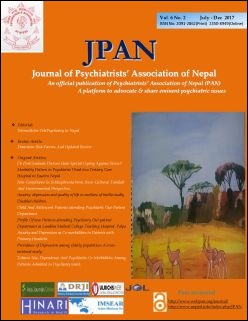Non-Compliance In Schizophrenia From Socio-Cultural, Familial And Environmental Perspective
DOI:
https://doi.org/10.3126/jpan.v6i2.21753Keywords:
Compliance, Non-Compliance, Schizophrenia, NepalAbstract
Introduction: Non-compliance significantly influences the course and outcome of treatment. Non-compliance in Schizophrenia is common and a major challenge globally due to need of long duration of treatment and other related factors. The objective of study was to identify patients with treatment non-compliance and associated factors in schizophrenia from socio-cultural, familial and environmental perspective.
Material and Method: This study identified non-compliance in schizophrenia among 80 patients attending outpatient department at department of psychiatry, Devdaha Medical College, Rupandehi, Nepal. The study was a descriptive cross section study and purposive sampling, a type of non-random sampling technique was utilized for study. Ethical consideration was done throughout the study and informed consent was taken prior to the study. The questionnaire was given to those patients who had insight into the illness and who were able to understand the questions in the pro forma. Informants of patients with poor insight were given questionnaire to complete.
Results: Out of 80 participants, majorities (57.5%) were male and 42.5% were female in the ratio 1.35:1. The mean age of respondent was 30.2±11.6. Approximately one seventh (13.75%) of them were illiterate, more than half (61.25%) had family income less than Nepalese rupees 10,000 a month. A significant proportion (15%) of family members did not know the role of them and relatives, and majority (76.25%) said that people contribute negatively. The different factors contributing to non-compliance were belief as non treatable illness (20%), significant life events (2.5%), migration (3.75%), lack of access of treatment nearby (72.5%), forget doctor appointment (11.25%), cessation of medication as per advise of faith healer (10%), stop medicine due to social stigma (15%), not monitoring patient on medication (15%) and discontinuation of treatment on refusal (11.25%).
Conclusion: The study explored noncompliance in Schizophrenia from socio-cultural, familial and environmental perspectives. Multiple factors were identified that contributed for non-compliance directly or indirectly. The non-compliance is a preventable condition that needs an emphasis from different perspectives.
J Psychiatrists’ Association of Nepal Vol. 6, No. 2, 2017, Page: 22-27
Downloads
Downloads
Published
How to Cite
Issue
Section
License
This license enables reusers to distribute, remix, adapt, and build upon the material in any medium or format, so long as attribution is given to the creator. The license allows for commercial use.




